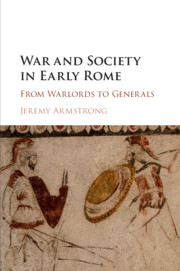Refine search
Actions for selected content:
15418 results in Military history
Chapter 6 - The Gallic sack, the rebirth of Rome, and the incorporation of the Latins (390–338)
-
- Book:
- War and Society in Early Rome
- Published online:
- 05 April 2016
- Print publication:
- 08 April 2016, pp 233-289
-
- Chapter
- Export citation
Conclusions
-
- Book:
- War and Society in Early Rome
- Published online:
- 05 April 2016
- Print publication:
- 08 April 2016, pp 290-294
-
- Chapter
- Export citation
Chapter 1 - The evidence
-
- Book:
- War and Society in Early Rome
- Published online:
- 05 April 2016
- Print publication:
- 08 April 2016, pp 18-46
-
- Chapter
- Export citation
Contents
-
- Book:
- War and Society in Early Rome
- Published online:
- 05 April 2016
- Print publication:
- 08 April 2016, pp vii-vii
-
- Chapter
- Export citation
Maps and figures
-
- Book:
- War and Society in Early Rome
- Published online:
- 05 April 2016
- Print publication:
- 08 April 2016, pp viii-viii
-
- Chapter
- Export citation
Chapter 4 - Fighting for land (509–452)
-
- Book:
- War and Society in Early Rome
- Published online:
- 05 April 2016
- Print publication:
- 08 April 2016, pp 129-182
-
- Chapter
- Export citation
Chapter 2 - Rome in the sixth century
-
- Book:
- War and Society in Early Rome
- Published online:
- 05 April 2016
- Print publication:
- 08 April 2016, pp 47-73
-
- Chapter
- Export citation

War and Society in Early Rome
- From Warlords to Generals
-
- Published online:
- 05 April 2016
- Print publication:
- 08 April 2016
1 - Life and death in a Kunming teahouse
-
- Book:
- General He Yingqin
- Published online:
- 05 March 2016
- Print publication:
- 29 March 2016, pp 12-34
-
- Chapter
- Export citation
4 - Xie Bingying opening public spaces to women Fighting patriarchy and fighting militarists
-
- Book:
- Women Warriors and Wartime Spies of China
- Published online:
- 05 March 2016
- Print publication:
- 29 March 2016, pp 66-90
-
- Chapter
- Export citation
Acknowledgements
-
- Book:
- Women Warriors and Wartime Spies of China
- Published online:
- 05 March 2016
- Print publication:
- 29 March 2016, pp ix-x
-
- Chapter
- Export citation
9 - “A tall building on shifting sands”
-
- Book:
- General He Yingqin
- Published online:
- 05 March 2016
- Print publication:
- 29 March 2016, pp 240-272
-
- Chapter
- Export citation
Index
-
- Book:
- Women Warriors and Wartime Spies of China
- Published online:
- 05 March 2016
- Print publication:
- 29 March 2016, pp 267-272
-
- Chapter
- Export citation
8 - “Maybe now the fire is hot enough to fry Ho Ying-ch'in!!!!”
-
- Book:
- General He Yingqin
- Published online:
- 05 March 2016
- Print publication:
- 29 March 2016, pp 206-239
-
- Chapter
- Export citation
Acknowledgements
-
- Book:
- General He Yingqin
- Published online:
- 05 March 2016
- Print publication:
- 29 March 2016, pp vii-viii
-
- Chapter
- Export citation
7 - Negotiating sexual virtue: The glamorous, honey-trap spy, Zheng Pingru
-
- Book:
- Women Warriors and Wartime Spies of China
- Published online:
- 05 March 2016
- Print publication:
- 29 March 2016, pp 137-157
-
- Chapter
- Export citation
8 - Ding Ling and Zhenzhen: Female chastity and good communist governance
-
- Book:
- Women Warriors and Wartime Spies of China
- Published online:
- 05 March 2016
- Print publication:
- 29 March 2016, pp 158-174
-
- Chapter
- Export citation
Contents
-
- Book:
- Women Warriors and Wartime Spies of China
- Published online:
- 05 March 2016
- Print publication:
- 29 March 2016, pp vii-vii
-
- Chapter
- Export citation
Chronology
-
- Book:
- Women Warriors and Wartime Spies of China
- Published online:
- 05 March 2016
- Print publication:
- 29 March 2016, pp xi-xii
-
- Chapter
- Export citation
Contents
-
- Book:
- General He Yingqin
- Published online:
- 05 March 2016
- Print publication:
- 29 March 2016, pp v-v
-
- Chapter
- Export citation
